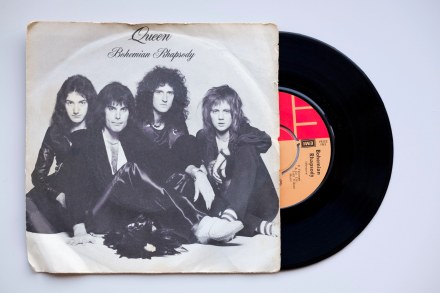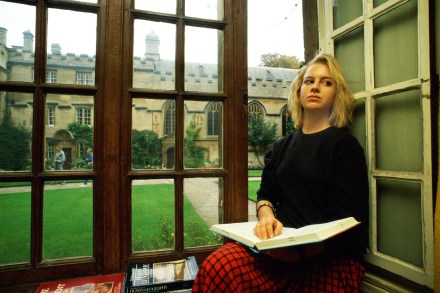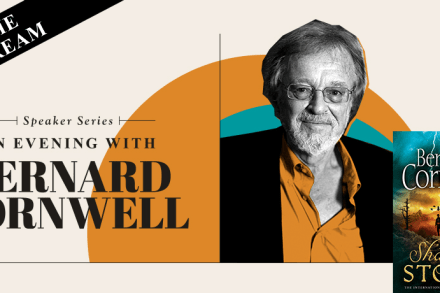Louvre crown jewels

‘Did you just heckle me about Prince Andrew?’

‘These homemade biscuits – are they meant to be trick or treat?’

‘Move over!’


‘The former Duke of York was marched to the top of the hill and left there.’


I have a distant cousin in Australia whom I have never met. This lady – her name is Moya – has a hobby researching our family’s history, and our paths first crossed virtually via Ancestry.com. This week, Moya told me an astonishing story she had uncovered about my late father’s second marriage to a dying woman convicted of murdering her own, beloved daughter. It is a truly tragic tale of Dickensian pathos and misery, but one that amazingly my dad never mentioned to me. I only learned the brutal facts from Moya thanks to the wonders of the internet. My father was in his sixties when I was born in

Sometimes a small detail in a news story tells you more than a months-long investigation splashed across the front page. ‘Starmer appears to realise that he needs to do more to connect with his party and has begun a new charm offensive,’ the Sunday Times reported. Some MPs have been invited for breakfast and ‘No. 10 has apparently purchased a new toaster to cater for the demand.’ There we have it, ladies and gentlemen. Keir Starmer’s secret weapon in his war against British decline: a few slices of Hovis and an awkward offer of jam. ‘Aerrr, are you planning to, um, support our Borders Bill? Oh, so sorry, we’ve got

About 20 years ago, the actor and comedian Steve Coogan did a tour called, with typical self-deprecation, Steve Coogan as Alan Partridge and Other Less Successful Characters. I saw the show and it was, as you’d expect from Coogan, amusing and cleverly performed. Yet it ended strangely; Coogan sang a self-lacerating song called ‘Everyone’s a Bit of a Cunt Sometimes’. It was oddly bitter and angry, but clearly Coogan stood by its sentiments, because he attempted to reprise the number in a dream sequence from his restaurant-review comedy The Trip several years later. The song, given full production values, was, perhaps wisely, deleted from the programme’s final cut. (Although you can still find
It is, officially, ‘cosy’ season. My social-media feeds have suddenly become very homely and wholesome: full of pictures of chunky knitwear, crisp leaves, soft blankets, flickering candles and crackling fires. I want to embrace this romanticisation of winter, I really do. I want to enjoy this slower routine of fluffy pyjamas, Christmas movies and aesthetically pleasing pumpkin lattes. I want to say that I love coming home from work, drawing the curtains and snuggling on the sofa with a glass of red and a paperback. I want to laugh that it doesn’t matter if I don’t see direct sunlight for the next four months because I can wear cashmere socks


My late son took film seriously, a taste I was delighted to see him develop, and regret not being able to see him grow out of. When he was little we watched the Pixar films, and they gave us great joy. The first 20 minutes of Up and the last 20 of Toy Story 3 have been called the only perfect bits of cinema, a formulation with a high quotient of truth. After our son’s death, my wife commented that she had never before seen me cry. I had always wondered if she’d spotted my tears at the end of Coco, or those I shed during Guardians of the Galaxy

‘I have searched everywhere for the “city of dreams” and found it here, in Ronda,’ Rilke wrote. Hemingway was more practical: ‘[Ronda] is where you should go if you ever go to Spain on a honeymoon or if you ever bolt with anyone. The entire town and as far as you can see in any direction is romantic background…’ Sixty miles inland from Málaga, encircled by mountains, Ronda stands on a plateau cut by a steep, narrow gorge some two hundred yards deep. Eroded over a period of five million years by the river that runs through it, this ravine divides the town in two and ends in a sheer
I thought that maybe being in a wheelchair would stop my louche lunching ways, but somewhat to my own surprise (though not that of my mates, I’d wager), this isn’t the case. ‘You push – I’ll pay!’ has become my battle cry. But as I am wheeled about at this time of year, a pucker of irritation repeatedly flickers across my features. Pumpkin this, pumpkin that – all leading inevitably to the monstrosity that is pumpkin spiced latte. The final straw in my deciding that pumpkin spiced lattes are utterly, well, deplorable was when the ghastly Hillary Clinton described herself as a fan – ‘until I saw how many calories


Queen’s ascendency began at around the same time as the first residents were moving their Axminster carpets and Party Sevens into Tower Hamlets’ Robin Hood Gardens, the Smithson-designed Brutalist estate that would go on to become a typical example of how post-war ‘streets in the sky’ concepts were almost always doomed to fail. Five decades on, just one small section of Robin Hood Gardens has survived for posterity. It’s been acquired by the Victoria and Albert Museum to, presumably, warn future generations of what can happen to a neighbourhood when you combine too much cheap concrete with not enough public consultation. Thanks to Freddie Mercury and co., one solitary example
To a certain extent, all doctoral theses are a bit ridiculous – and therein lies their genius. I am allowed to say this because I spent four years of my life researching French Catholicism’s engagement with the first world war for my doctoral thesis, which I nattily entitled Calvary or Catastrophe? Back then, I was a baby academic hoping for critical acclaim and my own office. I’ve long since been disabused of this dream and have left academia’s dreaming spires behind to become a journalist – a profession that offers me neither my own office nor critical acclaim, but a great deal of online abuse. And while I don’t expect

Football has a problem: there isn’t enough football. The world’s most popular thing is too popular. Fans seem to find it ludicrous that our entertainment is constrained by flesh and blood, that we can’t – like with everything else – just watch live football when we feel like it. It started to get like this when Sky bought the Premier League rights and set up the Sky Sports channels. They had realised people really like this stuff. People like it enough for you to air football content endlessly. Throughout the 2000s came Premier League Years, where people could watch football that happened ten years ago. If you were bored of

Watch Bernard Cornwell in conversation with The Spectator’s associate editor Toby Young as they discuss Cornwell’s new book, Sharpe’s Storm, and delve into his remarkable life and career via livestream, exclusively for Spectator subscribers. Author of more than 50 international bestselling novels, including The Last Kingdom and much-loved Sharpe series, Cornwell will discuss the real history behind his riveting tales of war and heroism, and the enduring appeal of historical fiction.


The time seems right to move from the flat to the jumps for tipping purposes. Qipco-sponsored Champions Day at Ascot is not the end of the flat season and the first day of racing at Cheltenham today does not mark the start of the National Hunt season but there is no more appropriate moment to switch. There have been highs and lows on the betting front this flat season but overall the former have outweighed the latter. In fact, it has been my most successful season yet as a tipster under the Penworthy pseudonym, with a profit of more than 84 points. It was certainly satisfying to tip the winners

No one is quite sure who invented the phrase ‘the shock of the new’. It may have been the American writer Harold Rosenberg back in the 1960s. Alternatively, it may have been the late, great Australian intellectual Robert Hughes, who used it as a title for a TV series. Whatever the answer, the phrase aptly captures a very human moment: when you encounter something so strangely and profoundly innovative you experience a visceral, emotional jolt. Those two thinkers applied the phrase to modern art, to the first jarring encounter with impressionism, Cubism, abstract expressionism. But it can also be applied, perhaps more appositely, to the first encounter with remarkable technology. Technology,